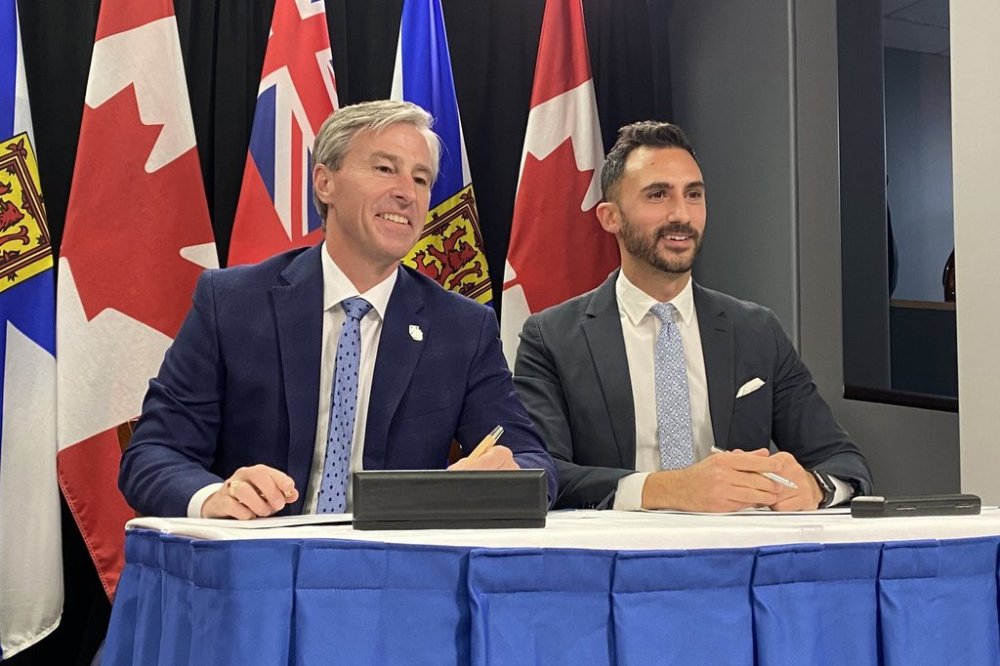Nova Scotia to learn from Ontario’s nuclear efforts as part of new agreement
Advertisement
Read this article for free:
or
Already have an account? Log in here »
To continue reading, please subscribe:
Monthly Digital Subscription
$0 for the first 4 weeks*
- Enjoy unlimited reading on winnipegfreepress.com
- Read the E-Edition, our digital replica newspaper
- Access News Break, our award-winning app
- Play interactive puzzles
*No charge for 4 weeks then price increases to the regular rate of $19.00 plus GST every four weeks. Offer available to new and qualified returning subscribers only. Cancel any time.
Monthly Digital Subscription
$4.75/week*
- Enjoy unlimited reading on winnipegfreepress.com
- Read the E-Edition, our digital replica newspaper
- Access News Break, our award-winning app
- Play interactive puzzles
*Billed as $19 plus GST every four weeks. Cancel any time.
To continue reading, please subscribe:
Add Free Press access to your Brandon Sun subscription for only an additional
$1 for the first 4 weeks*
*Your next subscription payment will increase by $1.00 and you will be charged $16.99 plus GST for four weeks. After four weeks, your payment will increase to $23.99 plus GST every four weeks.
Read unlimited articles for free today:
or
Already have an account? Log in here »
HALIFAX – Nova Scotia Premier Tim Houston says his government will learn from Ontario’s nuclear efforts as part of a new agreement he signed with its energy minister Thursday, despite having no near-future plans for nuclear power in the Atlantic province.
Ontario’s Minister of Energy Stephen Lecce and Houston, who appointed himself Nova Scotia energy minister two days ago, held a press conference in downtown Halifax to sign the memorandum of understanding on the topic of small modular reactors.
“It’s not a near-term thing, for sure,” Houston told reporters, noting that the province has no imminent plans to purchase a small modular reactor.

“But we need to be part of the process so we understand what is possible, and that’s what’s happening,” the premier said.
Small modular reactors are smaller and produce less energy than traditional nuclear power reactors, the Canadian Nuclear Safety Commission says.
Thursday’s agreement creates a framework for both provinces to share knowledge about nuclear technology, including how to manage nuclear waste, Houston said.
Earlier this week, Houston booted Trevor Boudreau from the energy portfolio — and from cabinet — and named himself to the role.
“I just thought it was important that as premier I be directly tied to that file,” the premier said Thursday. “It sends a message to Nova Scotians, but also to industry as well, of the importance that I hold it as the premier.”
Lecce said this agreement with Nova Scotia shows how Canada is “building momentum” on nuclear power. He noted that Saskatchewan, Alberta and New Brunswick have signed similar agreements with his province.
Earlier on Thursday, the federal and Ontario governments announced they would be putting a total of $3 billion toward a project to build four small nuclear reactors in the Greater Toronto Area.
Prime Minister Mark Carney has added the Darlington New Nuclear Project to his list of projects deemed to be in the national interest and therefore worthy of fast tracking. He and Premier Doug Ford were at the site east of Toronto to announce that Ottawa will contribute $2 billion and Ontario $1 billion.
“We’re talking about 18,000 construction jobs, 3,700 permanent jobs so far, just with a fleet of four …. But we can do more, we can scale. And that’s why we’re here, to further build that momentum,” Lecce said.
Houston said Nova Scotia will be watching this project closely, and the timeline of the construction will be of particular interest to him. Lecce told reporters that Ontario signed a memorandum of understanding to build reactors in 2019, and that construction began last year.
The first of the small modular reactors at the Darlington site will be connected to the power grid by 2029, Lecce said, with the full fleet of four in operation by 2034 or 2035.
Nova Scotia’s official Opposition NDP Leader Claudia Chender said Thursday the agreement doesn’t include any plans for nuclear development in the province, equating the news conference to a “shiny announcement when what we’re actually looking for is results.”
“Nova Scotia is going to watch a $3-billion investment in Ontario (that will) potentially produce a lot of economic development, and power and jobs. But beyond that, it’s totally unclear what, if any, benefit accrues to Nova Scotians,” Chender told reporters.
She said the agreement will not help the province reach its clean energy targets, create new jobs or improve energy affordability.
“This isn’t about nuclear energy in Nova Scotia … they were clear in the press release and in the MOU (memorandum of understanding) that it’s not even contemplated. So I’m not sure why our premier is so interesting in promoting Doug Ford across the province in Ontario and now right here at home,” Chender said.
This report by The Canadian Press was first published Oct. 23, 2025.

